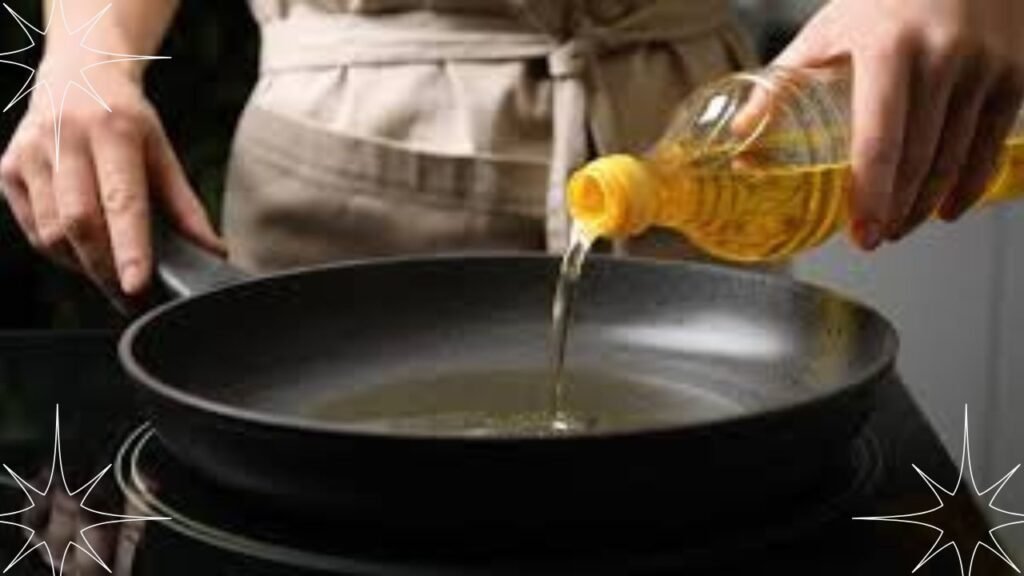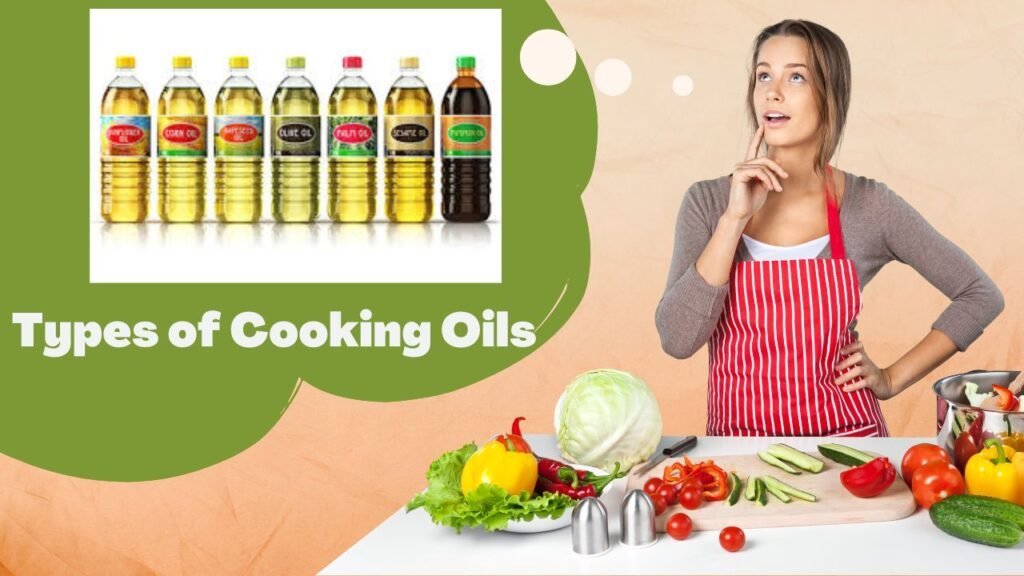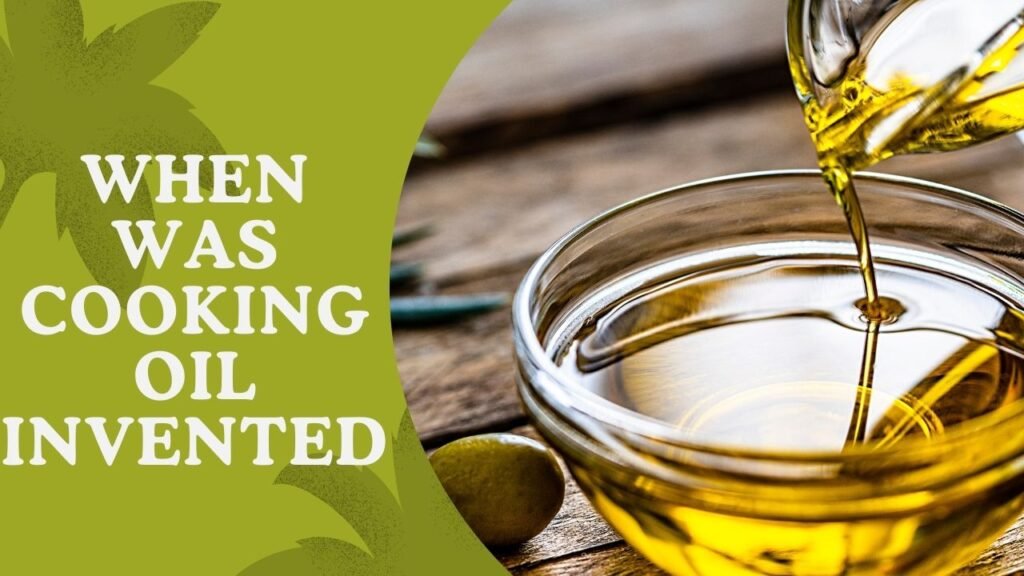Imagine a world without the rich flavors and textures that cooking oil brings to our dishes. From drizzling over salads to sautéing vegetables, cooking oil is indispensable in kitchens worldwide. But have you ever paused to ponder, when was cooking oil invented? Let’s embark on a flavorful journey through time to uncover the origins and evolution of this essential kitchen staple.
The Ancient Origins of Cooking Oil
Early Beginnings: Seeds and Fruits
Cooking oil’s story begins thousands of years ago, with ancient civilizations discovering the extraction of oils from seeds and fruits. When was cooking oil invented? The answer traces back to prehistoric times when humans first harnessed the power of plants for sustenance.
- Olive Oil: The olive tree, native to the Mediterranean region, provided one of the earliest and most enduring sources of cooking oil. Evidence suggests that olive oil was produced as far back as 6000 BCE in regions that are now part of modern-day Israel and Palestine.
- Sesame Oil: Originating in Africa and India, sesame seeds were pressed to extract oil around 3000 BCE. This oil was prized not only for cooking but also for its medicinal properties.
- Coconut Oil: In tropical regions, coconut oil has been a staple for centuries, used in everything from cooking to cosmetics.
The Role of Cooking Oil in Ancient Civilizations
Cooking oil wasn’t just about flavor; it played a significant role in various aspects of ancient life:
- Culinary Uses: Oils were essential for cooking, preserving food, and enhancing flavors.
- Religious and Ritualistic Practices: Many cultures used oils in religious ceremonies and as offerings to deities.
- Medicinal Purposes: Oils were employed in traditional medicine for their healing properties and as carriers for herbal remedies.
The Evolution of Cooking Oil Through the Ages
Medieval Innovations
As civilizations progressed, so did the methods of oil extraction and production. When was cooking oil invented? By the medieval period, oil production had become more sophisticated.
- Pressing Techniques: The development of mechanical presses allowed for more efficient extraction of oil from seeds and fruits.
- Trade and Exchange: The Silk Road and other trade routes facilitated the exchange of oil-producing techniques and varieties of oil across continents.
The Industrial Revolution and Modernization
The Industrial Revolution marked a turning point in cooking oil production. Advances in technology transformed oil extraction from a labor-intensive process to an industrial-scale operation.
- Refining Processes: Introduction of refining processes improved the quality and shelf life of cooking oils.
- Diverse Oil Varieties: New varieties of cooking oils emerged, including soybean, corn, and canola oil, expanding the culinary landscape.

Key Milestones in the History of Cooking Oil
To better understand the timeline of cooking oil’s invention and evolution, let’s take a look at some key milestones:
| Year | Milestone | Significance |
|---|---|---|
| 6000 BCE | Olive oil production begins in the Mediterranean | Establishes olive oil as a staple in cooking and rituals |
| 3000 BCE | Sesame oil extraction in Africa and India | Introduces sesame oil for culinary and medicinal uses |
| 1500 BCE | Introduction of coconut oil in tropical regions | Expands cooking oil varieties in different climates |
| 500 BCE | Greek and Roman advancements in oil pressing | Enhances oil extraction techniques and usage |
| 1600s | Spread of oil production techniques via trade routes | Facilitates global exchange of oil varieties and methods |
| 1800s | Industrial Revolution transforms oil production | Enables mass production and diversification of cooking oils |
| 1900s | Introduction of vegetable oils like soybean and canola | Diversifies cooking oil options and improves accessibility |
| 2000s | Rise of specialty oils and organic production | Meets modern demands for health-conscious and gourmet oils |
Types of Cooking Oils and Their Historical Context
Olive Oil: The Timeless Classic
Olive oil is arguably the oldest and most revered cooking oil, deeply embedded in Mediterranean culture. Its production dates back to ancient civilizations, and it remains a cornerstone in modern cuisine.
- Historical Uses: Used in cooking, lighting, and religious ceremonies.
- Modern Applications: Integral to salads, dressings, and various Mediterranean dishes.
Sesame Oil: The Flavorful Elixir
Sesame oil has a rich history in Asia and Africa, known for its distinct flavor and versatility.
- Historical Uses: Employed in cooking, traditional medicine, and as a base for sauces.
- Modern Applications: Essential in Asian cuisine, especially in stir-fries and marinades.
Coconut Oil: The Tropical Treasure
Coconut oil has been a staple in tropical regions for centuries, prized for its health benefits and versatility.
- Historical Uses: Used in cooking, skincare, and as a fuel source.
- Modern Applications: Popular in baking, frying, and vegan cooking as a butter substitute.

Animal Fats: The Traditional Cooking Medium
Before the widespread availability of vegetable oils, animal fats like lard and tallow were commonly used in cooking.
- Historical Uses: Essential for frying, baking, and as a preservative.
- Modern Applications: Still used in certain cuisines and for specific culinary techniques.
The Impact of Cooking Oil Invention on Society
Culinary Advancements
The invention and refinement of cooking oils revolutionized cooking methods, allowing for a wider variety of dishes and cooking techniques.
- Frying and Sautéing: Oils enabled high-heat cooking methods that enhance flavors and textures.
- Preservation: Oils helped preserve foods by creating barriers against spoilage.
Economic and Trade Implications
Cooking oils became valuable trade commodities, influencing economic relations and trade routes.
- Trade Routes: Oils like olive and sesame were traded extensively, shaping interactions between different cultures.
- Economic Growth: Oil production supported local economies and led to the development of related industries.
Health and Nutrition
The availability of various cooking oils has had a profound impact on health and nutrition.
- Nutritional Benefits: Different oils offer various health benefits, such as omega-3 fatty acids in flaxseed oil or antioxidants in olive oil.
- Dietary Choices: The diversity of cooking oils has allowed for more varied and balanced diets across cultures.
Modern Innovations in Cooking Oil Production
Sustainable and Eco-Friendly Practices
In recent years, the focus has shifted towards sustainable and eco-friendly oil production methods.
- Organic Farming: Increasing demand for organic cooking oils promotes environmentally friendly farming practices.
- Eco-Friendly Extraction: Advances in extraction technology reduce environmental impact and improve efficiency.
Specialty and Gourmet Oils
The market has seen a surge in specialty and gourmet oils, catering to diverse culinary preferences and health-conscious consumers.
- Infused Oils: Oils infused with herbs, spices, and other flavors add unique dimensions to dishes.
- Cold-Pressed Oils: Preserved nutrients and flavors through minimal processing appeal to health enthusiasts.
Table: Comparison of Popular Cooking Oils
| Cooking Oil | Origin | Smoke Point (°F) | Best For | Health Benefits |
|---|---|---|---|---|
| Olive Oil | Mediterranean | 375-420 | Sautéing, dressings | Rich in monounsaturated fats, antioxidants |
| Canola Oil | Canada | 400-450 | Frying, baking | Low in saturated fats, high in omega-3 |
| Coconut Oil | Tropical regions | 350-385 | Baking, frying, vegan cooking | Contains medium-chain triglycerides |
| Sesame Oil | Asia, Africa | 350-410 | Stir-fries, marinades | Contains antioxidants and healthy fats |
| Avocado Oil | Central America | 520 | High-heat cooking, grilling | High in monounsaturated fats, vitamin E |
| Peanut Oil | Africa, Asia | 450 | Frying, deep-frying | High smoke point, good for high-heat methods |
| Flaxseed Oil | Northern Hemisphere | 225 | Salad dressings, smoothies | Rich in omega-3 fatty acids |
The Cultural Significance of Cooking Oils
Mediterranean Influence
Olive oil is not just a cooking ingredient; it’s a cultural symbol in Mediterranean societies. It represents peace, prosperity, and the bounty of the land.
- Mediterranean Diet: Emphasizes the use of olive oil for its health benefits and rich flavor.
- Cultural Rituals: Olive oil is used in various ceremonies and traditional practices.
Asian Traditions
In many Asian cultures, sesame oil holds a place of honor, adding depth and complexity to dishes.
- Culinary Staples: Integral to the preparation of traditional dishes like stir-fries, noodles, and sauces.
- Symbolic Uses: Often used in offerings and rituals, symbolizing abundance and longevity.
African Heritage
Sesame and palm oils have deep roots in African culinary practices, reflecting the continent’s diverse agricultural landscape.
- Traditional Recipes: Used in stews, braises, and as a base for various sauces.
- Economic Importance: Key products in local economies and trade.
Personal Reflections: My Journey with Cooking Oils
Growing up, cooking oil was a constant in my kitchen, each type bringing its unique flavor and texture to our meals. I remember the rich aroma of olive oil during family gatherings and the nutty scent of sesame oil in my favorite stir-fry. Understanding when was cooking oil invented adds a layer of appreciation for these everyday ingredients that have such a profound impact on our lives.
FAQs About When Was Cooking Oil Invented
1. When did humans first start using cooking oil?
Humans began using cooking oil as early as 6000 BCE, with the production of olive oil in the Mediterranean region being one of the earliest recorded uses.
2. What was the first cooking oil ever used?
Olive oil is considered one of the first cooking oils used by humans, with evidence of its production dating back to ancient civilizations in the Mediterranean.
3. How has the production of cooking oil evolved over time?
Cooking oil production has evolved from manual pressing of seeds and fruits to advanced industrial extraction and refining processes, allowing for mass production and a wider variety of oils.
4. Are there any ancient cooking oils still in use today?
Yes, several ancient cooking oils like olive oil, sesame oil, and coconut oil are still widely used today, both in traditional and modern cuisines.
5. How did the Industrial Revolution impact cooking oil?
The Industrial Revolution introduced mechanical presses and refining techniques, making cooking oil more accessible and affordable while increasing the variety of available oils.
Final Thoughts
When was cooking oil invented? Its origins stretch back to the dawn of civilization, evolving alongside human society to become the versatile and essential ingredient we rely on today. From ancient olive groves to modern sustainable practices, the journey of cooking oil is a testament to human ingenuity and our enduring love for flavorful, nourishing food.
Next time you drizzle some olive oil over a salad or fry up a batch of crispy potatoes, take a moment to appreciate the rich history and innovation that brought cooking oil to your kitchen. It’s more than just a cooking medium; it’s a liquid legacy that continues to shape our culinary experiences.
So, whether you’re a seasoned chef or a home cook, understanding the origins and evolution of cooking oil can deepen your appreciation for this kitchen essential. Happy cooking!


